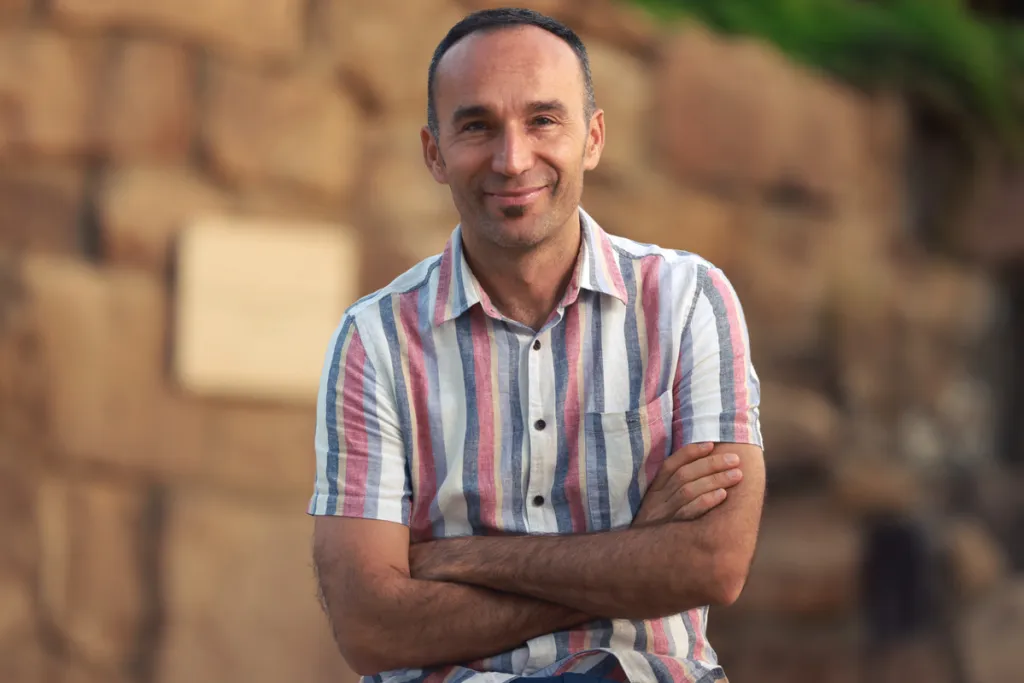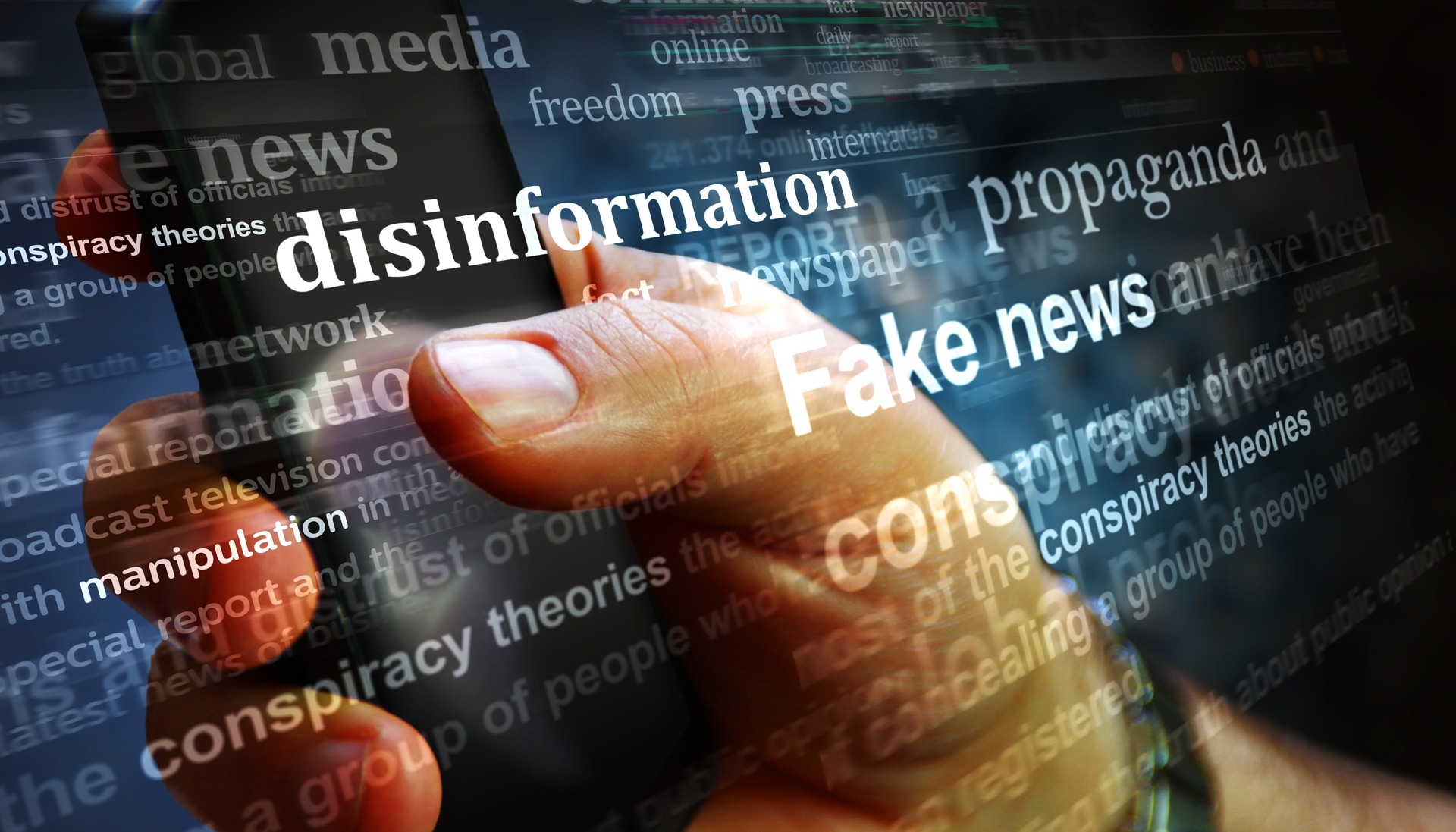By Devon Murray
Post-truth" has gone from buzzword to full-blown force in reshaping politics, media and public trust. Gabriele Cosentino, assistant professor in AUC's Department of Journalism and Mass Communication, explores how this phenomenon has been reshaping our understanding of truth and its influence on society over the past decade.
Through extensive research, Cosentino has found that the post-truth era is related to a broad decline of trust in institutions, including media and political bodies. "As trust in these entities has eroded, it has become harder for them to present information that a majority of people will believe and rely on," he says.
This loss of trust has created a new landscape where emotion and belief often trump fact, allowing misinformation to take hold and influence public opinion. "In the age of the internet, social media has allowed misinformation to spread faster and wider than ever before, disrupting traditional forms of political communication and leading to serious consequences," Cosentino adds.
The bulk of Cosentino's research on post-truth has culminated in two books -- Social Media and the Post-Truth World Order (Palgrave Macmillan, 2020) and The Infodemic. Geopolitics, Disinformation, and the Covid-19 Pandemic (Bloomsbury Academic, 2023). The first draws on case studies from around the world to demonstrate post-truth as a global phenomenon, and the second examines how the pandemic played out in the era of misinformation.

A New Era
Cosentino's interest in post-truth began during U.S. President Donald Trump's political ascension in 2016, which reminded him of Silvio Berlusconi, an Italian media tycoon-turned-politician and the topic of Cosentino's PhD dissertation at New York University. "A lot of people drew parallels between Trump and Berlusconi, so I wrote a book in 2017 that tried to make sense of Trump and link his success to the precedent set by Berlusconi. And then as I was writing this book, the whole topic of post-truth exploded."
With populist movements gaining ground in Western democracies and emerging powers like China challenging the world order, the era of global U.S. hegemony is coming to an end, Cosentino says. "What we are seeing now is a shift in global power dynamics and the unraveling of the U.S.-led liberal democratic model. A new geopolitical era is coming to life, and its contours are still blurry."
Cosentino argues that the shift goes beyond politics and economy, extending into ideology. For example, during the coronavirus pandemic, misinformation fueled distrust in vaccines and mask mandates, which he explores in his book, The Infodemic. He describes COVID-19 as the first public health crisis of the post-truth era, marked by an intense battle of information between experts and the public across media platforms.
Finally, the post-truth condition is characterized by emotions and beliefs taking precedence over facts and rationale. This can especially be seen in politics, where campaigns employ fear-based rhetoric to sway voters on issues like immigration, security and public health, creating divisions based on irrational fears rather than informed debate. "Traditional truths and established narratives are no longer universally accepted," he says. "In fact, they are being actively contested on multiple fronts."
The Emotional Economy
"Post-truth" was chosen by Oxford Dictionaries as its 2016 Word of the Year, a decision prompted by two political events that year that had shocked the world: the election of Donald Trump to the U.S. presidency and the Brexit referendum. "Both events were, in a way, symptoms of the post-truth crisis because they were marked by an overwhelming amount of false information -- both unintentional (what we refer to as 'misinformation') and intentional (what we call 'disinformation')," Cosentino says.
While misinformation and disinformation have always been present in politics and media, Cosentino emphasizes that social media platforms and the large tech companies behind them have greatly exacerbated the post-truth crisis. "People are growing more accustomed to getting their news through social media instead of traditional media companies," he says. "This shift has sparked a power struggle between tech giants and traditional media, both vying for attention and legitimacy."
"It's not that society has moved past truth, but rather that truth has become irrelevant."
Social media platforms thrive on emotional, rather than rational, engagement. "That's where the business model draws much of its power," Cosentino explains. "Watching a self-proclaimed citizen journalist report news while walking down the street feels much more authentic than, say, reading a polished piece from The New York Times, which has likely undergone rigorous research. Unfortunately, a lot of these self-styled journalists are misinformation or propaganda peddlers."
Moreover, social media platforms are designed to boost viral content that keeps users engaged, regardless of its veracity. This can have severe consequences, as illustrated by Cosentino in Social Media and the Post-Truth World Order. He presents the case of Myanmar, where Facebook spread false information and hate speech against the Rohingya, a predominantly Muslim ethnic group, contributing to the 2017 genocide carried out by Myanmar's security forces.
"The interethnic problems in Myanmar predated the arrival of Facebook, of course, but its aggressive marketing and unsupervised popularization in a fragile democracy produced a quick exacerbation of political issues," he says.
As these companies continue to resist regulation and more sensational content goes unchecked, Cosentino warns that there will continue to be major consequences. "Tech companies have amassed an excessive amount of power, and we are now seeing the impact," he says.
Divide and Conquer
Cosentino reminds us that the impact of social media platforms hasn't always been negative: "Just a few years before 2016, these platforms were hailed as agents of democratization and liberation for societies led by authoritarian governments," he says. "However, after seeing that they could be used to upset the political order, authoritarian regimes studied them to see how they could be used for opposite ends -- to stifle dissent and suppress opposition."
A prime example Cosentino gives of this shift is Russia, which has been found responsible for running countless disinformation campaigns around the world. "The Russians elevated this game to an art form, really," he says. "It caught everyone -- security agencies, politicians and citizens -- by surprise."
Russia has employed disinformation campaigns to influence domestic politics in the United States and Europe, sow fear and hatred toward humanitarian organizations like the White Helmets in Syria and spread anti-Western sentiment in the Central African Republic.
"Using fake accounts, bots, memes, hashtags and viral content, we can see the weaponization of social media by using the same features that activists had used just a few years ago, but now to spread misinformation and propaganda, and ultimately divide society," Cosentino says.
These campaigns are now also an established practice for governments in Turkey, Iran, Venezuela, Saudi Arabia, Israel and China, among others, where they employ paid citizens, known as state-sponsored trolls, to push content online, Cosentino says. "Of course, they are also used by non-state actors, such as conservative ethno-nationalists or anti-vaxxer groups in the United States and Europe."
The platforms that once promised democratization are now being weaponized to manipulate and divide society, particularly in politics. "For me, at the heart of post-truth lies a political crisis, especially in Western democracies," Cosentino says.
Finding Truth
If the age of unquestioned truths is over, how can we know what to believe? Cosentino writes in the conclusion of Social Media and the Post-Truth World Order that we can no longer reach the truth, nor even get close. "Not because we lack information, but rather because of the sheer amount of conflicting, misleading and constantly changing information that we are exposed to," he writes. "Too much information has cluttered our ability to form a rational opinion and propagandists and demagogues know this all too well."
Despite the efforts of some mainstream media outlets to strengthen their authority by adhering to rigorous journalistic standards, Cosentino argues that recent political events have put us back to square one. "Trump's 2024 victory shows how much impact false information had on the election cycle," he says. "It's not that society has moved past truth, but rather that truth has become irrelevant, as fictional narratives have supplanted evidence-based analysis in forming public opinion."
However, Cosentino believes that the future is not all doom and gloom. "There are no easy solutions, but people can make an effort. In general, internet and social media users are becoming more digitally literate. I can see a growth in awareness in my classroom and online. Of course, tech platforms also need to do their part and be held accountable for their responsibility in allowing the spread of false information," he says.
As the effects of the post-truth era continue to reveal themselves, Cosentino is committed to documenting them through his research. "The political problems resulting from this are very complex and may even take a generation to solve," he says. "As our trust in journalism and scientific inquiry declines, so does our support for democracy, its processes and its institutions. To protect democracy we need a more informed and responsible public opinion, and a better regulated information environment."


